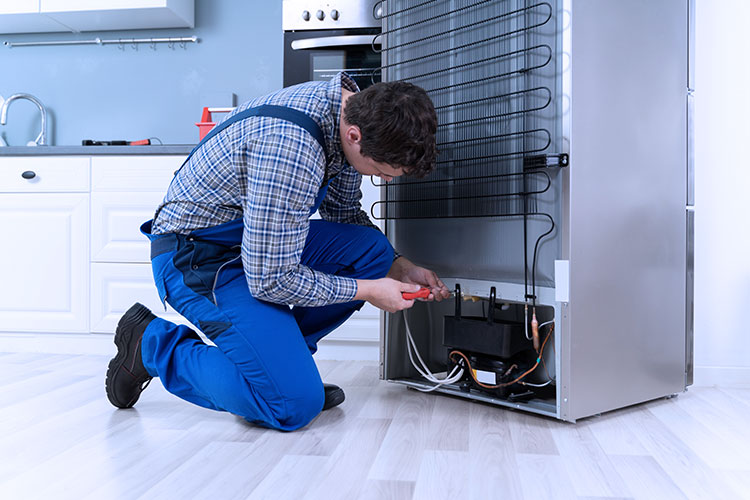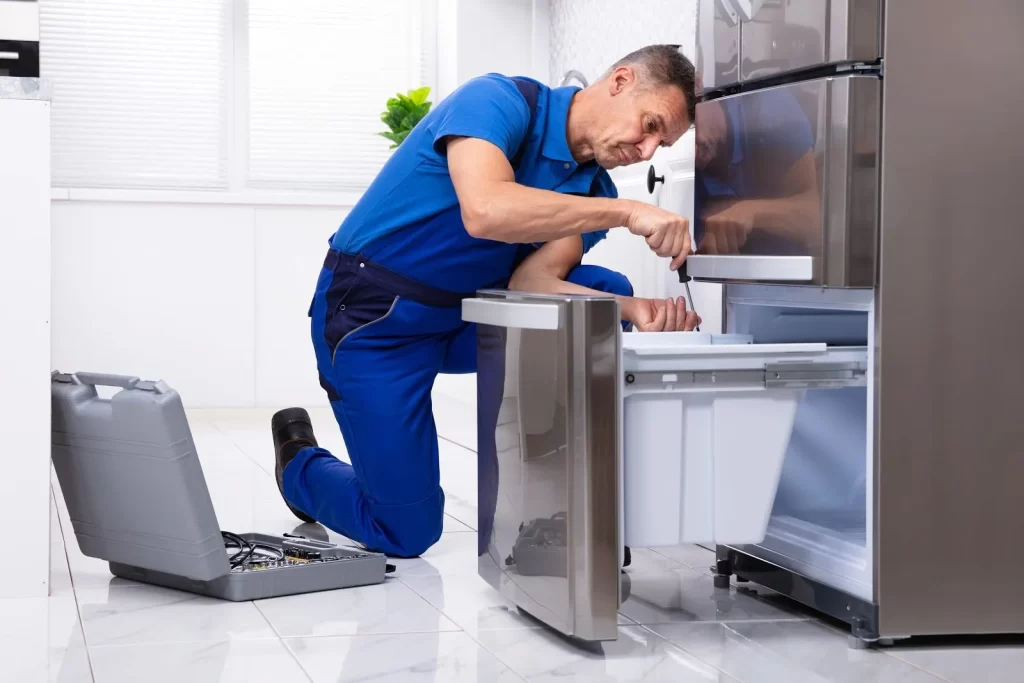The Ultimate Guide to Do It Yourself Device Repair Strategies
From refrigerators to dish washers, comprehending exactly how to fix and fix these devices can conserve you time and money. Are you ready to discover essential strategies that will empower you to deal with repair work confidently?
Comprehending Common Device Issues
When you depend on your home appliances, it can be annoying when they all of a sudden stop working or break down. Comprehending usual device problems can assist you troubleshoot problems efficiently. If your refrigerator isn't cooling, examine the temperature level setups or inspect the door seal for gaps. A defective cleaning equipment could be due to a blocked drain filter or a damaged belt.
If your oven isn't heating, malfunctioning elements or thermostat issues might be responsible. Dishwashing machines typically experience troubles with drain, so make certain the filter is clean and the drainpipe hose pipe isn't kinked.
Additionally, pay attention for uncommon sounds; they usually suggest mechanical problems. By acknowledging these signs, you can save time and possibly avoid pricey repair services. A little knowledge goes a lengthy method in keeping your home appliances, so stay notified to maintain whatever running smoothly.
Essential Tools for Do It Yourself Fixes
Before diving into do it yourself appliance repair work, it's vital to gather the right tools to guarantee the process goes efficiently. Beginning with a good set of screwdrivers, consisting of both flathead and Phillips, as they're vital for opening up most appliances. You'll also want a set of pliers for gripping and twisting wires or little parts.
Don't neglect a multimeter; it assists you test electrical elements and diagnose issues effectively. A socket collection is handy for loosening up or tightening up bolts, while an energy knife can be beneficial for opening up or cutting cables product packaging.
Finally, consider having a flashlight handy to brighten dark rooms inside your appliances. With these crucial tools, you'll be well-appointed to tackle numerous repair work, saving both money and time. So, collect your equipment and obtain ready to roll up your sleeves!
Safety First: Preventative Measures to Take
Prior to you begin any type of appliance fixing, it's important to prioritize safety and security. Make sure you wear individual protective tools, disconnect the source of power, and maintain your workplace organized. These basic safety measures can help stop mishaps and ensure a smoother repair service process.

Personal Protective Tools
Safety and security equipment is a crucial part of any kind of DIY device repair service job. You must always wear security goggles to protect your eyes from dirt and particles. A sturdy set of gloves will certainly shield your hands from unsafe products and sharp edges. Think about utilizing a mask if you're dealing with chemicals or dirt, ensuring you breathe safely while working. Steel-toed boots are also a smart selection, especially when lifting heavy devices. Do not fail to remember to put on long sleeves and pants to protect your skin from possible injuries. By prioritizing personal safety equipment, you'll greatly lower the danger of accidents and injuries. Remember, being prepared with the right equipment keeps you secure and focused on finishing your repair work effectively.
Source Of Power Interference
To guarantee a safe do it yourself appliance repair work, disconnecting the source of power is vital. Prior to you begin any kind of job, you ought to unplug the device or transform off the circuit breaker. This simple step stops electrical shocks and warranties that you can concentrate on the repair without stressing over accidental activation. Always confirm that the device is off by checking it with a voltage tester. If you're taking care of bigger home appliances, like a washing machine or clothes dryer, ensure to safeguard the power cable and stay clear of any kind of call with water. Keep in mind, security first! When you're positive that the power is disconnected, you can with confidence wage your repairs, knowing you've taken the required precautions to protect on your own.
Workspace Organization
A well-organized job location can make all the difference in your DIY home appliance fixing task. Beginning by removing your work space of clutter to stop directory distractions and crashes. A clean area not only improves performance yet additionally keeps you risk-free while you work on your appliance repair work.
Step-by-Step Guide for Fridge Fixes
When your fridge starts acting up, it can be aggravating, but taking on the issue on your own can save you time and cash. Inspect for usual concerns like temperature level fluctuations or unusual sounds. For a loud refrigerator, inspect the follower and confirm it's not blocked.
If there's water pooling inside, examine the door seals for damages or dirt, and clean them if needed. When you have actually dealt with the issue, connect the refrigerator back in and check it for a couple of hours.
Repairing Cleaning Machine Issues
Much like fridges, cleaning machines can offer their own collection of difficulties, yet several issues can be resolved with a little troubleshooting. If your equipment won't start, examine the power cord and confirm it's connected in. Next off, check the door lock; a damaged lock can stop the cycle from beginning. If you notice unusual noises throughout procedure, it may be due to international items embeded the drum or the drainpipe pump.
If your clothes aren't obtaining clean, think about the water level and detergent type; using too much detergent can produce excess suds, impacting performance. For leaks, analyze the pipes for fractures or loose links. Tightening up these can often solve the problem. Normal upkeep, like cleansing the filter, can stop numerous issues from arising. Bear in mind, a little troubleshooting goes a long means in keeping your cleaning maker running efficiently.
Repairing Stoves and Stoves
Exactly how can you repair typical problems with your oven or range? Start by inspecting the power supply. Make sure it's connected in and the circuit breaker image source is not tripped. If it's a gas cooktop, confirm the gas shutoff is open. Next off, test the heaters: if they don't spark, cleanse the igniter and look for blockages in the burner ports.
If your oven isn't home heating, evaluate the temperature settings and verify the door seals tightly. A defective burner could likewise be the culprit; you may require to replace it if it's damaged.
For irregular food preparation, rotate your frying pans and consider utilizing a stove thermometer to validate accurate temperatures. Lastly, if you listen to uncommon noises or smell gas, turn off the appliance instantly and consult an expert. By adhering to these actions, you can identify and fix lots of usual stove and cooktop concerns successfully.
Fixing Dishwashers Made Easy
When your dishwasher starts acting up, it can be frustrating, but addressing common issues isn't as difficult as it appears. You'll discover step-by-step troubleshooting methods that will certainly aid you identify the issue, in addition to the essential devices you'll need to deal with repair work yourself. Let's make repairing your dish washer a wind!
Usual Dish Washer Problems
While dish washers are made to make your life less complicated, they can occasionally run into typical issues that leave you feeling frustrated. If your dishwasher's door won't lock, it can be a basic concern with the latch mechanism or door seal. Resolving these concerns early can save you time and inconvenience down the roadway.

Detailed Troubleshooting
Prior to diving into repair work, it's essential to determine the details concern your dishwasher is dealing with. If your dishwasher will not begin, check the power supply and door latch. By methodically resolving each possible concern, you can determine the issue and take the necessary steps to fix it, making your dishwasher feature like brand-new once again.
Crucial Repair Service Tools
When fixing your dishwashing machine,Having the right devices at your disposal can make all the difference. Beginning with a screwdriver set, as you'll commonly require both Phillips and flathead alternatives. A multimeter's important for detecting electrical issues, while pliers can help you grip and manipulate different elements. Don't fail to remember a bucket or towels for any water spills throughout repair services.
If you're tackling blockages, a drain snake or a wet/dry vacuum cleaner will certainly be very useful. You could additionally desire a degree to assure your dish washer's appropriately aligned. Ultimately, security equipment like gloves and goggles will shield you while you work. With these essential Get More Information devices, you'll be fully equipped to tackle any type of dishwashing machine repair service challenge that comes your means.
Regularly Asked Concerns
How Do I Identify if an Appliance Deserves Repairing?
To identify if an appliance's worth fixing, consider its age, repair work prices, and current worth. If repairs go beyond half the replacement cost, you may intend to buy a new model instead.
Can I Locate Substitute Components Locally for My Appliance?
Yes, you can commonly discover substitute components locally for your home appliance. Inspect hardware stores, appliance service center, or regional classifieds. Don't neglect to bring the model number to assure you obtain the proper component!
When Fixing Devices?, what Typical Mistakes Should I Prevent.
When repairing appliances, stay clear of hurrying with diagnostics, ignoring safety and security preventative measures, or utilizing inaccurate tools. Do not avoid checking out handbooks or watching tutorials; they supply necessary support. Be individual and thorough to assure successful repair work and avoid more damages.
For how long Does a Regular DIY Appliance Fixing Take?
A common DIY device fixing normally takes one to three hours, relying on the complexity. You'll intend to gather your devices and materials initially, and follow directions very carefully to avoid unnecessary hold-ups.
Are There Any Type Of Guarantees for Do It Yourself Home Appliance Repairs?
When you deal with do it yourself home appliance fixings, warranties typically do not cover your work. Nonetheless, some manufacturers may recognize guarantees for components you replace. Constantly check your home appliance's service warranty terms prior to starting any kind of repair work to stay clear of concerns.
Before diving into DIY home appliance repairs, it's essential to gather the right tools to ensure the procedure goes smoothly.Before you start any type of device fixing, it's important to prioritize security.To assure a secure Do it yourself device repair, disconnecting the power source is important.A well-organized work area can make all the difference in your DIY appliance repair project. Always check your appliance's warranty terms prior to beginning any type of repair services to avoid concerns.